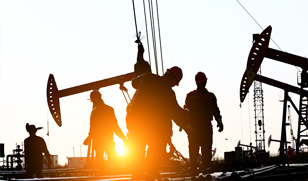 2022 / 27 / May
2022 / 27 / May
When domestic politics plays with oil
(Control of Bai Hassan field)
Harith Rasmi Al-Hiti
The Bay Hassan field is located west of Kirkuk (Sarkalan district) in the Debs district, and production began in it since June of 1959 and is one of Iraq's oldest oil fields, and the wells of the Bai Hassan field are deeper than the wells of the Kirkuk field and its depth is estimated between one thousand five hundred meters to three thousand meters. The total production capacity of this field is 80,000 barrels per day, and the field extends over a large area located between Kirkuk and Nineveh on the one hand and Kirkuk and Erbil on the other.
In 2014, the Peshmerga forces took control of the Bai Hassan and Daoud field after the withdrawal of federal forces, and the latter regained control of these areas in October 2017 following measures taken by the central government following the announcement of the Kurdistan Region referendum on independence/secession on September 25 of the same year.
In August 2007, the Kurdistan Regional Government approved Law No. 22 of 2007 on the region, and the reasons for this law stated "in order to develop the oil wealth in the Kurdistan region so as to achieve the highest benefit for the people of Kurdistan and the Iraqi people in general using the techniques of the most advanced market principles and encouraging investment in line with the provisions of Articles (111, 112, 115) of the Federal Constitution...... In support of the future of future generations and those who suffered under the repressive policies of the former regime in Iraq...... And to consolidate cooperation with the federal government on the management of oil and gas with regard to the fair distribution of oil revenues as stipulated in the federal constitution and all of the above legislated this law." Despite all these long years, this law has not been implemented by the central government.
On the fifteenth of February this year, the Federal Supreme Court issued its decision on the unconstitutionality of the Oil and Gas Law of the Kurdistan Regional Government No. 22 of 2007 and its cancellation for violating the provisions of Articles (110, 111, 112, 115, 121, 130) of the Constitution of the Republic of Iraq for the year 2005, and the court's decision obligated the Kurdistan region "to hand over the entire oil production from the oil fields in the Kurdistan region and other areas from which the Ministry of Natural Resources in the Regional Government extracted oil and delivered it to the federal government, represented by the Ministry of Oil." and enable it to use its constitutional powers regarding oil exploration, extraction and export." This decision, which Kurdistan rejected and considered unjust, unconstitutional.
Almost two months after the issuance of the aforementioned court decision, and in his speech before the opinion panel at the Ministry of Oil on April 28, 2022, the Minister of Oil, Ihsan Abdul Jabbar, spoke about the ministry's concern for the sale of crude oil in the region, noting that the cost of producing a barrel represents 50% of its price, which is much lower than the price of "SOMO", and that the percentage of revenues in the region does not exceed 50% of the value of the oil sold. He pointed out the need to have a single policy for oil and gas production in Iraq. The Federal Oil Minister stressed that his ministry does not want a central administration of the oil file, but a federal administration and wants to organize this activity transparently to guarantee the rights of all parties.
This came after the failure of meetings and dialogues between the Federal Ministry of Oil and a delegation from the Kurdistan region, which began last April.
New Now:
The North Oil Company announced in a statement on Saturday what it called the encroachment on the wells of the Bai Hassan/Dawood field by an armed force of the regional government accompanied by a technical team, and the company indicated that the aim of this violation is to exploit the production capacities of these wells for the benefit of the regional government. She explained that such abuses and violations were not the first, as they preceded them in (Khurmala, Avana, Safiya, Kormur) and there are lawsuits before the competent Iraqi courts.
In the face of this, Dr. Jotyar Adel, spokesman for the Kurdistan Regional Government, denied what he called "allegations and rumors" alleging the occupation of the Bai Hassan and Daoud Kori field by an armed force of the region. "Under the Iraqi constitution, public wealth belongs to all Iraqis and is not the property of a company. The North Oil Company has been operating for years in the absence of an oil and gas law, violating the constitution, and if it is keen to solve problems, the oil and gas law must be legislated on the basis of the constitution." The strange thing is that at the time of preparing this paper, we did not find a statement by the Federal Ministry of Oil about the reality of what happened and is happening there. Nothing emerged from the last meeting of the Iraqi Council of Ministers.
What to expect:
The issue of the permanent dispute between the region and the center remains caused by the main reason is the absence of legislation that would regulate the relationship of the central government with the governments of the regions, or if we want to be accurate, it is often to corner laws and legislation aside and deal with the logic of understandings and settlements, even if it requires that these understandings be unconstitutional and completely illegal. For example, one of the problems that arises from time to time is the issue of oil, especially oil in the disputed areas – Kirkuk, for example – in addition to oil revenues from fields located within the geographical boundaries of the Kurdistan region, and what helped this is the absence of the oil and gas law that was supposed to enter into force more than fifteen years ago, this law that would regulate the relationship more between the center and the Kurdistan region.
After the decision of the Federal Supreme Court, which ruled the invalidity of the oil and gas law in Kurdistan in February of this year, no one rules out that a new bomb may explode at any moment again between the center and the region, especially since there are parties that support, incite and wish until such a moment, and it is important here to emphasize that politics and its tensions have played a role in bringing out this decision now, otherwise the complaint had been submitted twice before the attention of the Federal Supreme Court, the first in 2012 and 2019, and here we cannot look at the law and its repercussions away from the new political understandings and the game of forming the next government, these understandings that may restore the shape of alliances again.
It is expected that this decision has repercussions on the form of the alliance led by Mr. Sadr with the National Party of Kurdistan and the Sovereignty Alliance headed by (Mohammed Al-Halbousi) and although there are some opinions that consider that the decision of the Federal Court was intended to embarrass Sadr and put the Kurds in front of a new reality after their alliance with Sadr and Halbousi, but Sadr really has two options, both passed, either to deal seriously with the decision of the Federal Supreme Court and here there is no guarantee that the party will remain with him in the event that The framework provided guarantees that would make this decision a dead letter, or leave this decision and deal again with new political understandings that could block the decision of the Federal Supreme Court and delay the implementation of the decision.
The movement of this force coming from the Kurdistan region and its control of the Bai Hassan field – if true – will enable the Kurdish leadership to have another pressure card to serve it in its negotiations and alliances for the formation of the government and the election of the President of the Republic. In the future, there could be an existing settlement in the following form: that this force would withdraw from Bai Hassan in exchange for new agreements with the center to solve the problem of oil and its revenues.
One last note is a must:
The Irish thinker Edmund Burke said, "If we control our wealth we will be rich and free, but if we control our wealth we are really poor."

Harith Rasmi Al-Hiti